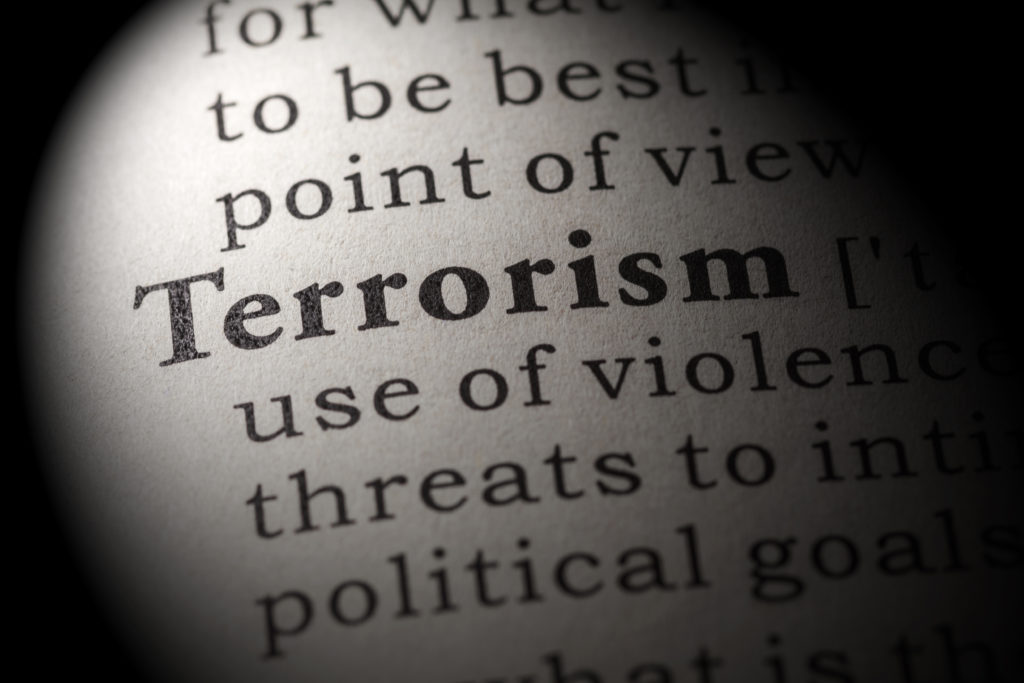
Terrorism – “a crime that has no equal”
Terrorism differs from other threats – in its capacity to generate global conflict; in its propagation of criminal enterprise; in its ability to inflict damage at a level once reserved only for sovereign entities; and in its pursuit of WMD[ii].
Whereas the primary interest of most criminals is personal gain of some sort, and not the destruction of themselves or society as a whole, the objective of terrorism is to undermine – if not destroy – the societies or countries they target. While criminals for the most part avoid large-scale massacres of uninvolved persons, the primary purpose of terrorist activity is to create victims – the more the better. So, while crime can exist without mass murder and may in fact benefit from avoiding it – terrorism cannot. And even if criminals or other miscreants were to aspire for whatever reasons to destroy society as a whole, rarely do they have the tools to do so.
The terrorist threat has been magnified by globalization which has generated a new partnership between terrorist bodies and organized crime – a nexus described by the U.S. DEA’s former Chief of Operations Michael Braun as “representing “the most significant security challenge facing governments around the world.… [It is] no longer about crime rates. It is about global instability.”[iii]
The scope, intent, method and impact of terrorism clearly set it apart as a distinct category of transnational threat. The “special danger”[iv] it poses has been recognized as such in multiple UN Resolutions and by the Canadian courts which have determined that terrorist offences are “abnormal crimes”[v]– and that terrorism as a phenomenon is a “crime unto itself” that “has no equal…. [N]ot limited to, the senseless destruction of people and property … [i]t attacks our very way of life and seeks to destroy the fundamental values to which we ascribe – values that form the essence of our constitutional democracy.”[vi]
Terrorists are aware of the shortcomings and limitations of our domestic legal systems, and proactively exploit these gaps to their advantage.[vii] It will be up to legislators to find more creative and effective tools for contending with this challenge. This responsibility cannot be ignored or deferred. In the words of UN Secretary-General Ban Ki-moon: “Whether we like it or not our generation will go down in history as the one that was challenged to protect the world from terrorism”.[viii]
Endnotes
[ii] Rolf Mowatt-Larssen, director of intelligence for the Department of Energy, has contended that focusing on the WMD interests of al Qaeda alone would be a mistake, from the perspectiveof stopping a nuclear attack. “The sober reality,” Mowatt-Larssen cautioned, “is that the threat posed by nuclear terrorism is much broader than the aspirations of any single terrorist group.” Rolf Mowatt-Larssen, director, Department of Energy, Office of Intelligence and Counterintelligence, “The Strategic Threat of Nuclear Terrorism”(paper presented at a policy forum sponsored by the Washington Institute for Near East Policy, Washington, D.C., June 16, 2008). Available online(www.washingtoninstitute.org/templateC07.php?CID=404).
[iii] Michael Braun, “Drug Trafficking and Middle Eastern Terrorist Groups: A Growing Nexus?” (lecture sponsored by the Washington Institute for Near East Policy, Washington, D.C., July 18, 2008). www.washingtoninstitute.org/templateC05.php?CID=2914).
[iv]R v. Khawaja
[v] http://www.csis-scrs.gc.ca/nwsrm/spchs/spch29102009-eng.asp#tphp
[vi]http://www.duhaimelaw.com/2011/07/02/supreme-court-agrees-to-hear-challenge-
to-anti-terrorism-law/
[vii] http://www.washingtoninstitute.org/policy-analysis/view/stemming-the-flow-of-terrorist-financing-practical-and-conceptual-challenge
[viii] http://www.un.org/sg/statements/?nid=2452